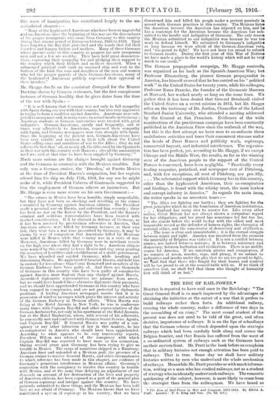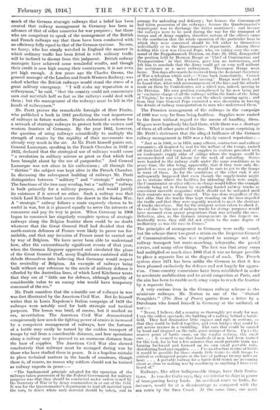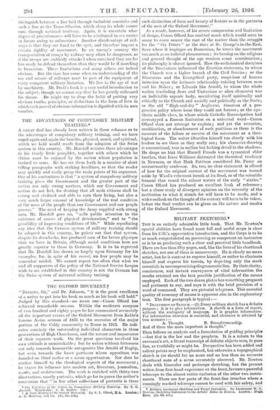THE RISE OF RAIL-POWER.* •
MOLTKE is reported to have said once in the Reichstag : " The Great General Staff is so much impressed by the advantages of obtaining the initiative at tho outset of a war that it prefers to build railways rather than forts. An additional railway, crossing the whole country, makes a difference of two days in the assembling of an army." The most casual student of the present war does not need to be told of the great, and often decisive, importance-of railways. It is on the lips of schoolboys that the German scheme of attack depended upon the strategic railways which had been carefully built along and- across tho Belgian frontier, and that Russia has suffered from the want of a co-ordinated system of railways such as the Germans have on their eastern front. Mr. Pratt in the book before us complains that in military histories not enough attention has been paid to railways. That is true. Some day we shall have military histories written by mon who understand the whole mechanism of railways. Meanwhile Mr. Pratt provides us with much informa- tion, writing as a man who has studied railways, not as a student of strategy who incidentally understands railways. The romantic quickening of the subject, however, is more likely to come from ilia strategist than from the railwayman. We have heard so The Eise of Rail-Pozeer in War and Concave, 1833-1914. By Edwin A. Pratt. London : 1'. S. King and Son; [7s. 43d. net.]
!much of .the German strategic railways that a belief has been created that railway management in Germany has been in adVance of that of Other countries for war purposes ; but those who are competent to speak of the management of the British and French railways say that these have been conducted with an efficiency fully equal to that of the German systems. No one, we fancy, who has simply watched in England the manner in which ordinary traffic has been fitted in with military traffic will be inclined to dissent from this judgment. British railway managers have achieved some wonderful results, and though their credit is now high among their countrymen, it is not even yet high enough. A few years ago Sir Charles Owens, the general manager of the London and South-Western Railway, was asked whether the British railways would stand the stress of a great military emergency. " I will stake my reputation as a railwayman," he said, " that the country could not concentrate men and materials half so fast as the railways could deal with them ; but the management of the railways must be left in the hands of railwaymen."
Mr. Pratt praises the remarkable foresight of Herr Ponitz, who published a book in 1842 predicting the vast importance Of railways in future warfare.' Ponitz elaborated a scheme for a network of strategic railways to protect both the eastern and western frontiers of Germany. By the year 1842, however, the question of using railways scientifically to multiply the strength of armies by the rapidity of their movements was already very much in the air. As Mr. Pratt himself points out, General Lamarque, speaking in the French Chamber in 1832 or 1833; declared that the strategical use of railways would cause " a revolution in military science as great as that which had been brought about by the use of gunpowder." And General Lamarque was not alone in his enthusiasm ; all through the " thirties " the subject was kept alive in the French Chamber. In discussing the subsequent building of railways Mr. Pratt distinguishes between " military " and " strategic " railways. The functions of the two may overlap, but a " military " railway is built primarily for a military purpose, and would justify its existence if it served no other. Such a railway was that which Lord Kitchener laid across the desert in the Sudan War. A " strategic " railway follows a route expressly chosen to be useful in war, but it is planned equally to serve the -interests of commerce and pay its way in peace. When Germany in 1908 began to construct her singularly complete system of strategic railways along the Belgian frontier there could be no doubt whatever that the Great General Staff had decided that the north-eastern defences of France were likely to prove too for- midable, and that any invasion of France must be carried out by way of Belgium. We have never been able to understand how, after the extraordinarily significant events of that year, when the German Emperor approved and circulated the plans of the Great General Staff, many Englishmen contrived still to delude themselves into believing that Germany would respect the neutrality of Belgium. An example of railways being built without any reference to the needs of military defence is afforded by the Australian lines, of which Lord Kitchener wrote that they aro of " little use for defence, although possibly of considerable value to an enemy who would have temporary command of the sea."
Mr. Pratt considers that the scientific use of railways in war was first illustrated by the American Civil War. But he himself writes that in Louis Napoleon's Italian campaign of 1859 the railways were notably used for both strategic and tactical purposes. The lesson was brief, of course, but it marked an era, nevertheless. The American Civil War demonstrated conspicuously how much the fighting power of armies is increased by a competent management of railways, how the fortunes of a battle may easily be turned by the sudden transport of troops by rail from a considerable distance, and how operations along a railway may be pressed to an enormous distance from the base of supplies. The American Civil War also showed conclusively that .railways must be managed during war by those who have studied them in peace. It is a hopeless mistake to place technical matters in the hands of amateurs, though there is, of course, no reason why soldiers should not be trained as railway experts in peace , -
"The fundamental principle adopted for the operation of the railways-taken possession of by. the Federal-Government for military purposes was that they should be conducted under orders issued by the Secretary of War or by Army commanders in or out of the field. It was for the Quartermaster's department to load all material upon the -cars, to direct where such material should be taken, and to arrange for unloading and delivery ;. but because the Government had taken possession of the railways ; because the Quartermaster's department was to discharge the duties mentioned ; and because the railways were to be used during the war for the transport of troops and of Army supplies, therefore certain of the officers came to the conclusion that the whole operation of the particular lines in which they were concerned should be left either to themselves individually or to the Quartermaster's department. Among those holding this view was General Pope, who, on taking over the com- mand of the Rappahannock Division, on June 26, 1862, disregarded the position held by Herman Haupt as ' Chief of Construction and Transportation' in that Division, gave him no instructions, and - left him to conclude that the Army could get on very well without his assistance as a mere railwayman. Thereupon Haupt went home. Ten days afterwards he received from the Assistant-Secretary of War a telegram which said :--` Come back immediately. Cannot get on without you. Not a wheel moving.' Haupt went back, and he found that, what with mismanagement of the lines and the attacks made on them by Confederates, not a wheel was, indeed, moving in the Division. His own position strengthened by his now being put in exclusive charge of all the railways within the limits of the Army of Virginia,' he was soon able to set the wheels running again ; and from that time General Pope exercised a wise discretion in leaving the details of railway transportation to men who understood them."
The Prussian management of the railways in the campaign of 1866 was very far from being faultless. Supplies were rushed to the front without regard to the means of handling them. Wagons were hopelessly blocked there, while there was a shortage of them at all other parts of the line. What is more surprising is Mr. Pratt's statement that the alleged brilliance of the German railway management in 1870 was a falssly earned 'reputation :-
"Just as in 1866, so in 1870, army officers. contractors and railway companies, all inspired by zeal for the welfare of the troops, rushed off train-load after train-load of supplies to stations provided with an inadequate supply alike of sidings where the wagons could be accommodated and of labour for the work of unloading. Stores were handed to the railway staffs under the same conditions as in peace time, the idea being, apparently, that if they were only dis- patched as soon as possible they would be sure to get to the troops in want of them. As for the conditions at the other end, it not unfrequently happened that even though the supply-trains might go to stations where the facilities for unloading them were ample, the Commissariat or other officers in charge would follow the example already being set in France by lealtrding loaded railw ty trucks as convenient movable magazines which should not be unloaded until their contents were really wanted. This was done regardless of the fact alike that the trucks thus kept standing on the lines impeded the traffic and that they were urgently wanted to meet the shortage of trucks elsewhere. But for the stringent action taken to check it-, the evil due to this use of railway trucks for storage purposes would have assumed even graver proportions than was actually the case. Defective, also, as the German arrangements in this respect un- doubtedly were, they still did not attain to the same degree of inefficiency as was the case in France."
The principles of management in Germany were really sound, but the scheme threw too great a strain on the Inspector-General of Communications, who was required to manage not only railway transport but route-marching, telegraphs, the postal service, and many other things. The fact was that army cores had multiplied so much since 1866 that it was no longer possible to place a separate line at the disposal of each. The French system since 1871 has been unlike the German in that it has been planned exclusively for defence and not largely for aggres- . son. Cross-country connexions hays been established in order to accelerate mobilization and to avoid congestion at Paris, and the aim has been to enable each army corps to reach the frontier by a separate -line.
A very curious item in the German railway scheme is the miniature railways. Mr. Norton in one of the "Oxford Pamphlets" (The Man of Peace) quotes from a letter by a Dutchman who found himself in Germany at the outbreak of
war :—
" Never, I believe, did a country so thoroughly get ready for war. I saw the oddest spectacle, the building of a railway behind a battle- field. They had diminutive little engines and rails in sections, so that they could be bolted together, and even britIrs that could be put across ravines in a twinkling. Flat cars that could be carried by hand and dropped on the rails, great strings of them. Up to the nearest point of battle came, on the regular railway, this small one. . . . It seemed to me that hundreds of man had been trained for this task, for in but a few minutes that small portable train was buzzing backward and forward on its own small portable rails, distributing food and supplies.. . . I've an idea that in time of battle it would be possible for those sturdy little trains to shift troops to critical or endangered points at the rate of perhaps twenty miles an hour. . . . A portable railway for a battle-field struck me as coming about as close to making war by machinery as anything I have ever heard of."
Railways, like other indispensable things, have their limita- tions. As von der Goltz says, they are inferior to ships in power of transporting heavy loads. An overland. route to India, for -instance, would be at a disadvantage as compared. with the sea route by the Suez Canal. At the same time, one must
distinguish between a line laid through turbulent countries and such a line as the 'Trans-Siberian, which along its whole course rune through national territory. Again, it is uncertain what degree of preeariousness will have to be attributed to sea routes in future owing to submarines. Another disadvantage of rail- ways is that they are fixed to the spot, and therefore impose a certain rigidity of movement. In an enemy's country the transportation of troops by railway may often be dangerous, as if the troops are suddenly attacked when entrained they are far less ready to defend themselves than they would be if marching in formation. These limitations and many others are indeed obvious. But the time has come when an understanding of the use and misuse of railways must be part of the equipment of every competent military historian. We live in the ago of war by machinery. Mr. Pratt's book is a very useful introduction to the subject, though we cannot say that he has greatly enlivened his theme. He might try to drop the habit of putting very obvious truths, principles, or deductions in the form of lists in which each morsel of obvious information is dignified with its own number.




































 Previous page
Previous page